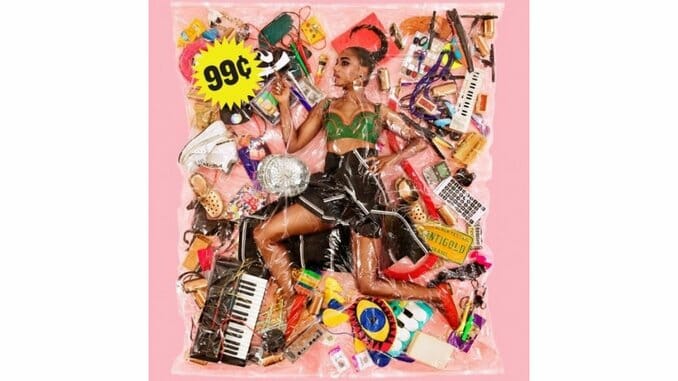Santigold: 99¢

Santigold has always been in conversation with pop. From top to bottom, in choruses, asides verses and entire songs, her first album overflowed with militant statements about artistic integrity and authenticity. Master of My Make-Believe, her moody second album, was more fixated on the roiling world that artists live in, but it wasn’t a departure from form. Buried beneath and between the songs about disaffected youth, a crumbling America and lurking pirates were truculent taunts mocking the way the pop landscape had morphed in Santigold’s image, overflowing with artists whose eccentricity was merely embroidered in their fast-fashion seams rather than embedded in their artistic DNA. 99¢ draws from that same well of repulsion and scorn, but it also pushes against it, decrying the misery of the contemporary music marketplace, but still clamoring for a place on the sales rack.
Denouncing the market while peddling a commercial product should be a tough balancing act, but Santigold pulls it off by fully embracing the contradiction. The album cover features her shrink-wrapped in plastic, surrounded by miscellaneous belongings and marred by a gleaming yellow sticker sarcastically declaring the market value of her life and her work: 99 cents. But though Santigold is clearly dissatisfied with the undervaluation of her music, the cover is also playful, brimming with color and style and panache.
That sense of sunny cheekiness radiates throughout the album, especially on songs that openly accept established pop paradigms. “Banshee” is pure bubblegum, bright synths swirling around crisp percussion, short verses flowing into stratospheric builds and meteoric drops. But then the song is also genuinely about the mythical banshee, harbinger of death. “Let me keep preaching to my choir/ Will you take me down or push me higher,” Santigold belts, begging for the banshee to leave her shoulder, for the market and its narrow demands to let her make music in peace.
-

-

-

-

-

-

-

-

-

-

-

-

-

-

-

-

-

-

-

-

-

-

-

-

-

-

-

-

-

-

-

-

-

-

-

-

-

-

-

-








































